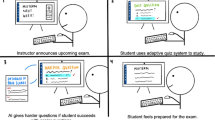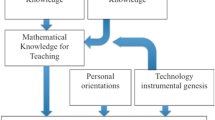Abstract
We report on one aspect of an extended research and development project that was conducted to support teachers’ development of mathematical knowledge for teaching (MKT) algebra through participation and authentic engagement in online collaborative mathematical problem solving. This article expands on our recent work, which has succeeded in developing a model for supporting teachers’ mathematical development at a distance that has shown great promise for supporting significant gains in teachers’ MKT. Specifically, this ex-post-facto analysis consisted of qualitative, micro-level analysis of the content of teachers’ activity and generated artifacts and helps us understand how the various collaborative activities (specific combinations of interaction, instructor support and feedback, and technology) supported and/or constrained the development of MKT algebra in an online environment.


Similar content being viewed by others
Notes
For operations other that addition, replace this language with the relevant operation, identity, and inverse.
References
Bakhtin, M. M., & Holquist, M. (1981). The dialogic imagination: Four essays. Austin: University of Texas Press.
Ball, D. L., & Bass, H. (2003). Toward a practice-based theory of mathematical knowledge for teaching. Paper presented at the 2002 Annual Meeting of the Canadian Mathematics Education Study Group, Edmonton, Alberta, Canada.
Ball, D. L., Hill, H. C., & Bass, H. (2005). Knowing mathematics for teaching: Who knows mathematics well enough to teach third grade, and how can we decide? American Educator, 29(3), 14–22, 43–46.
Ball, D. L., Thames, M. H., & Phelps, G. (2008). Content knowledge for teaching: What makes it special? Journal of Teacher Education, 59(5), 389.
Borba, M. C. (2005). The transformation of mathematics in on-line courses. In H. Chick & J. Vincent (Eds.), 29th Conference of the International Group for the Psychology of Mathematics Education (Vol. 2, pp. 169–176). Melbourne, Australia: PME.
Borba, M. C., Malheiros, A. P. S., & Zulatto, R. B. A. (2010). Online distance education. Rotterdam, The Netherlands: Sense Publishers.
Borba, M. C., & Villarreal, M. E. (2005). Humans-with-media and the reorganization of mathematical thinking: Information and communication technologies, modeling, visualization and experimentation. New York: Springer Science+Business Media.
Bransford, J., Brown, A., & Cocking, R. (2000). How people learn. Washington, DC: National Research Council.
Clark, P. G., Moore, K. C., & Carlson, M. P. (2008). Documenting the emergence of “speaking with meaning” as a sociomathematical norm in professional learning community discourse. The Journal of Mathematical Behavior, 27(4), 297–310. doi:10.1016/j.jmathb.2009.01.001.
Clay, E. L., & Silverman, J. (2008a). Online Asynchronous Collaboration in mathematics teacher education. Proceedings of the 20th annual meeting of the International Society for Information Technology and Teacher Education. Las Vegas, NV: SITE.
Clay, E. L., & Silverman, J. (2008b). Online collaboration in mathematics teacher education. In J. Cortina (Ed.), Proceedings of the joint meeting of the International Group for the Psychology of Mathematics Education and the North American Chapter of the International Group for the Psychology of Mathematics Education Moreila. Michoacán, Mexico: PME.
Clay, E. L., Silverman, J., & Fischer, D. (2010). Reconciling two perspectives on mathematics knowledge for teaching. In E. D. Brosnan, D. B. Erchick & L. Flevares (Eds.), Proceedings of the thirty second annual meeting of the North American Chapter of the International Group for the Psychology of Matheamtics Education (pp. 1071–1078). Columbus, OH: PME-NA.
Cobb, P. (2000). Conducting teaching experiments in collaboration with teachers. In R. A. Lesh & E. Kelly (Eds.), New methodologies in mathematics and science education. Dordrecht, Netherlands: Kluwer.
Cobb, P., & Bauersfeld, H. (1995). The emergence of mathematical meaning: Interacting in classroom cultures. Hillsdale, NJ: L. Erlbaum Associates.
Cobb, P., Boufi, A., McClain, K., & Whitenack, J. (1997). Reflective discourse and collective reflection. Journal for Research in Mathematics Education, 28(3), 258–277.
Cobb, P., Stephan, M., McClain, K., & Gravemeijer, K. (2001). Participating in classroom mathematical practices. Journal of the Learning Sciences, 10, 113–164.
Cobb, P., & Yackel, E. (1996). Constructivist, emergent, and sociocultural perspectives in the context of developmental research. Educational Psychologist, 31(3/4), 175–190.
Cuoco, A. (2005). Mathematical connections: A companion for teachers and others. Washington, DC: Mathematical Association of America.
Dorfler, W. (1993). Computer use and views of the mind. In C. Keitel & K. Ruthven (Eds.), Learning from computers: Mathematics education and technology. Berlin: Springer.
Erlwanger, S. (1973). Benny’s conception of rules and answers in IPI mathematics. Journal of Children’s Mathematical Behavior, 1(2), 7–26.
Hill, H. C., & Ball, D. L. (2004). Learning mathematics for teaching: Results from California’s Mathematics Professional Development Institutes. Journal for Research in Mathematics Education, 35(5), 330–351.
Hill, H. C., Rowan, B., & Ball, D. L. (2005). Effects of teachers’ mathematical knowledge for teaching on student achievement. American Educational Research Journal, 42(5), 371–406.
Lave, J., & Wenger, E. (1991). Situated learning: Legitamate peripheral participation. Cambridge: Cambridge University Press.
Ma, L. (1999). Knowing and teaching elementary mathematics: Teachers’ understanding of fundamental mathematics in China and the United States. Mahwah, NJ: Lawrence Erlbaum Associates.
McClain, K., & Cobb, P. (2001). The development of sociomathematical norms in one first-grade classroom. Journal for Research in Mathematics Education, 32(3), 236–266.
Nicodemi, O. (2007). Introduction to abstract algebra with notes to the future teacher. Saddle River, NJ: Pearson.
Pea, R. (1987). Cognitive technologies for mathematics education. In A. Schoenfeld (Ed.), Cognitive science and mathematics education (pp. 89–122). Hillsdale, NJ: Lawrence Erlbaum Associates.
Sfard, A. (2007). When the rules of discourse change, but nobody tells you: making sense of mathematics learning from a commognitive standpoint. Journal of the Learning Sciences, 16(4), 565–613. doi:10.1080/10508400701525253.
Sfard, A. (2008). Thinking as communicating: human development, the growth of discourses, and mathematizing. New York: Cambridge University Press.
Sfard, A., & Lavie, I. (2005). Why cannot children see as the same what grown-ups cannot see as different? Early numerical thinking revisited. Cognition and Instruction, 23(2), 237–309. doi:10.1207/s1532690xci2302_3.
Silverman, J. (2011). Supporting the development of mathematical knowledge for teaching through Online Asynchronous Collaboration. Journal of Computers in Mathematics and Science Teaching, 30(1), 61–78.
Silverman, J. (2012). Exploring the relationship between teachers prominence in online collaboration and the development of mathematical content knowledge for teaching. Journal of Technology and Teacher Education 20(1), 47–69.
Silverman, J., & Clay, E. L. (2009). Supporting teachers’ development of coherence through a focus on mathematical structure. Atlanta, GA: Paper presented at the annual meeting of the North American Chapter of the International Group for the Psychology of Mathematics Education.
Silverman, J., & Clay, E. L. (2010a). Developing mathematical content knowledge for teaching in an Online Professional Development Program. Irvine, CA: Paper presented at the annual meeting of the Association of Mathematics Teacher Educators.
Silverman, J., & Clay, E. L. (2010b). Online Asynchronous Collaboration in mathematics teacher education and the development of mathematical knowledge for teaching. The Teacher Educator, 45(1).
Silverman, J., & Thompson, P. W. (2008). Toward a framework for the development of mathematics content knowledge for teaching. Journal for Mathematics Teacher Education, 11(6), 499–511.
Simon, M. A. (2006). Key developmental understandings in mathematics: A direction for investigating and establishing learning goals. Mathematical Thinking & Learning, 8(4), 359–371.
Simon, M. A. (2010). Extending the coordination of cognitive and social perspectives. In M. Pinto & T. Kawasaki (Eds.), Proceedings of the 34th conference of the International Group for the Psychology of Mathematics Education (Vol. 4, pp. 177–183). Belo Horizonte, Brazil: PME.
Usiskin, Z., Peressini, A., Marchisotto, E. A., & Stanley, D. (2003). Mathematics for high school teachers: An advanced perspective. Upper Saddle River, NJ: Pearson Education.
Author information
Authors and Affiliations
Corresponding author
Rights and permissions
About this article
Cite this article
Clay, E., Silverman, J. & Fischer, D.J. Unpacking Online Asynchronous Collaboration in mathematics teacher education. ZDM Mathematics Education 44, 761–773 (2012). https://doi.org/10.1007/s11858-012-0428-8
Accepted:
Published:
Issue Date:
DOI: https://doi.org/10.1007/s11858-012-0428-8




